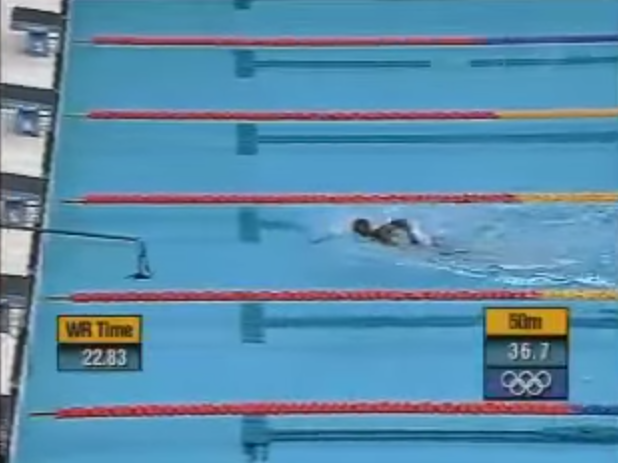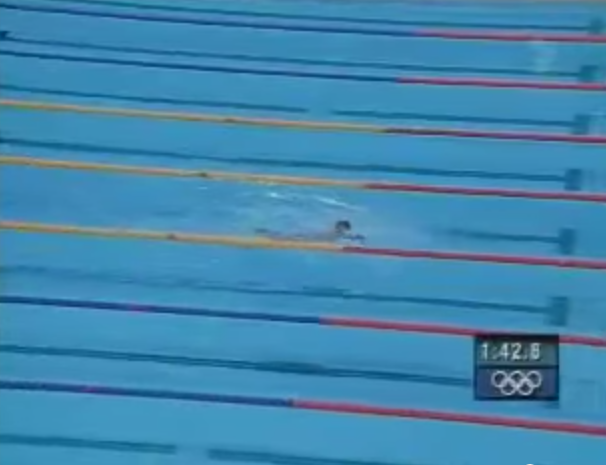Eric the Eel
In 1905, the International Swimming Federation began recording the fastest times of competitive swimmers in different races. For the 100m freestyle, a Hungarian swimmer named Zoltan Halmay is the first name in the record book — on December 3, 1905, he swam that distance in one minute, 5.8 seconds. His record fell two and a half years later at the Summer Olympics in London, when American Charles Daniels took gold with a time of 1:05.6. The record would fall over and over again as the years ticked by.
Fast forward to the 2000 Summer Olympics in Sydney, Australia. Going into the Games, the world record in the 100m freestyle was 48.21 seconds, but it fell early in the games, when Australia’s own Michael Klim swam a 48.18 leg in the 4x100m freestyle relay. It fell again three days later, when Pieter van den Hoogenband of the Netherlands won his semi-final heat with a 47.84 second swim.
And then, there was Eric the Eel.
He wasn’t quite as fast.

That’s an screen shot of Eric the Eel — Eric Moussambani is his real name — in his initial 100m relay heat. He’s not going very fast. At the time, the world record pace at fifty meters was 22.83 seconds. Moussambani was more than 60% over that while still a few body lengths from the wall. He was going very, very slowly, at least for an Olympian.
To make matters worse, Moussambani came off the blocks aggressively, expending a lot of energy in the first fifty meters. By the time he reached the last twenty-five meters, he had slowed down considerably, as seen below.
The image quality isn’t great but the information is clear enough. Moussambani isn’t close to done with his swim — the wall isn’t even in sight — and he’s already nearly a minute off the world record. In fact, he’d finish at 1:52.72. That’s about half a second faster than Hoogenband’s world record swim and Halmay’s — if you added them together. Which, you’d not do, as that’s silly.
Moussambani’s snail-like pace (even accounting for the fact that snails can’t swim) was, in large part, due to his training. Moussambani was representing the tiny nation of Equatorial Guinea in the Olympics, and his country was hardly a swimming powerhouse. As Wikipedia notes, “Moussambani gained entry to the Olympics without meeting the minimum qualification requirements via a wildcard draw designed to encourage developing countries without expensive training facilities to participate,” and Moussambani’s experience fit that bill perfectly. Moussambani’s training began less than a year before the Olympics and did so in a lake; the first time he had seen a 50m swimming pool in person was at the Games themselves.
So no one expected Moussambani to win the gold, let alone his heat. But if you give the images above a second look, you may notice something: there’s no one else in the pool. If you assumed that was because Moussambani was going so slowly that the rest of the heat had already passed him and gotten out of the camera’s view, you’d be happily mistaken. Moussambani is the only person in the pool because the other two racers in his heat both false-started and were therefore disqualified. Moussambani’s 1:52.72 was incredibly slow, but it was fast enough to win the heat.
(And it was also an Equatorial Guinean record.)
You can watch the entirety of Moussambani’s record-setting victory heat via this link. You’ll hear some laughter in the background and snarky comments from the commentators. That’s because the clip is from an Australian comedy show, but the swim footage is genuine. And fantastic.
Bonus Fact: By gross national income (GNI), Equatorial Guinea is the 46th richest nation in the world and the richest in Africa. But that’s faint praise. According to UNICEF, only about half the nation has access to clean drinking water and 20% of children born there die before reaching their fifth birthday.
From the Archives: Faster than a Speeding Bullet: Why Olympic swim organizers have to account for the speed of sound.
Related: A book on the most “memorable moments of Olympic swimming.” Eric the Eel gets an entire chapter!

